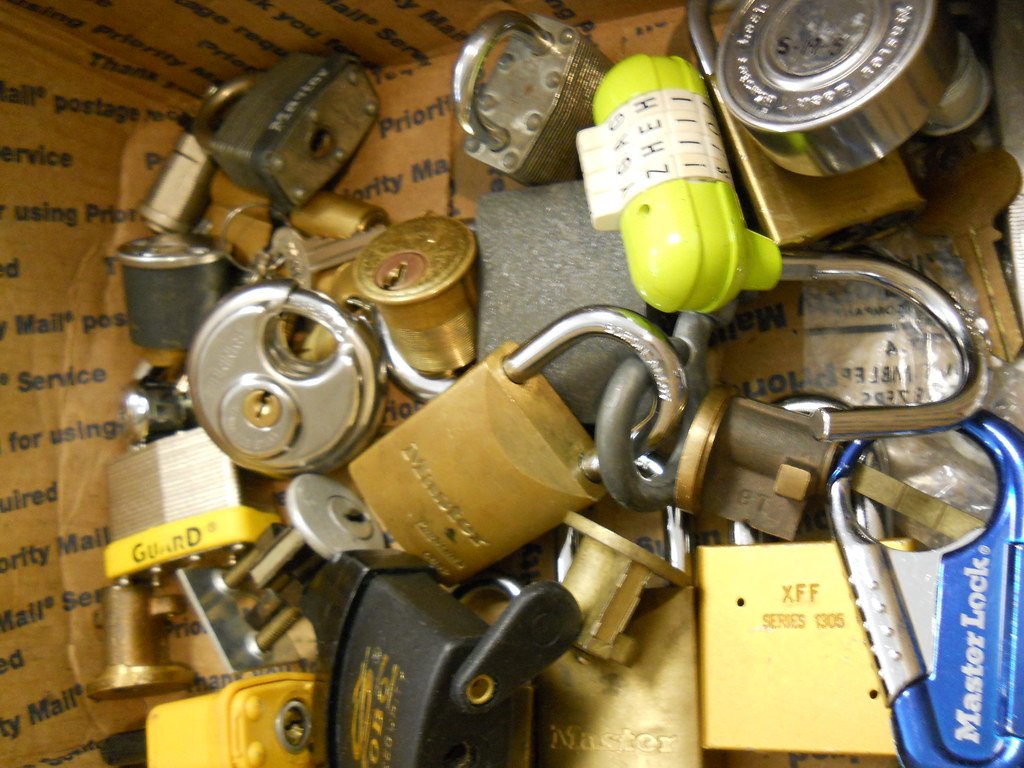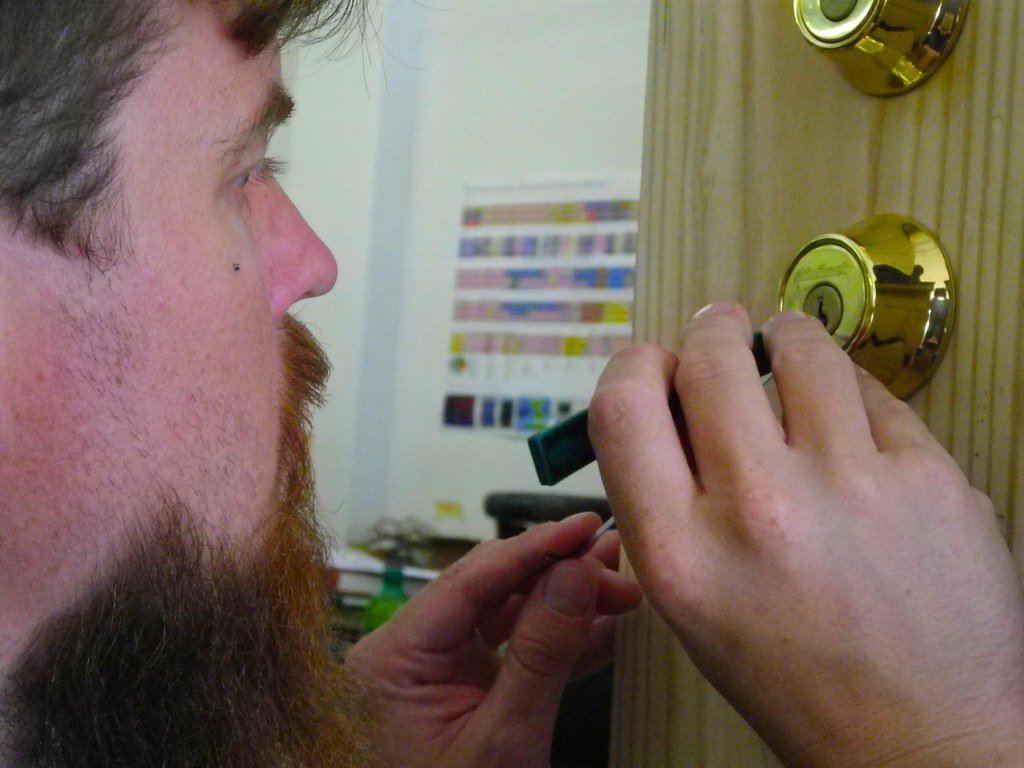Locksport, an art form that straddles the intriguing realms of skill and morality, has long captivated the imaginations of enthusiasts and skeptics alike. With its origins rooted in the noble pursuit of understanding locks and security systems, this intricate craft has evolved into a multi-faceted discipline that requires not only dexterity and finesse but also a delicate consideration of ethical boundaries. Controversial yet undeniably compelling, the enigmatic world of locksport beckons us to explore the complex web of questions surrounding its moral implications. In this comprehensive guide, we delve into the heart of this debate, aiming to shed light on the intricate tapestry of ethics that underpins the captivating realm of locksport.
Table of Contents
- The Ethics of Locksport: A Comprehensive Guide
- Exploring the Foundation of Locksport as a Recreational Endeavor
- Understanding the Importance of Ethical Locksport Practices
- Navigating the Boundaries between Locksport and Criminal Activity
- Promoting Responsible Locksport through Education and Collaboration
- Maintaining an Ethical Locksport Community: Best Practices and Recommendations
- Q&A
- Key Takeaways

The Ethics of Locksport: A Comprehensive Guide
Locksport, the art of manipulating locks to test their security, has always been a topic of ethical debate. As enthusiasts, it is crucial for us to understand and adhere to a set of principles that guide our actions. In this comprehensive guide, we delve into the ethics of locksport, exploring the boundaries and responsibilities that come with this fascinating hobby.
One of the core principles of locksport ethics is the inherent respect for the law. While testing our skills and knowledge is the very essence of locksport, it is vital to acknowledge and respect the legal boundaries surrounding it. As such, engaging in locksport activities should never involve unlawful entry or destruction of property. By choosing to hone our skills within legal frameworks, we ensure the integrity of our craft and respect the rights of others.
It is also crucial to prioritize the ethical exchange of knowledge within the locksport community. Sharing techniques, strategies, and tools is a fundamental aspect of locksport culture. However, it is essential to do so responsibly and ensure information is disseminated to trusted individuals who genuinely share our values. By promoting responsible knowledge sharing, we create a community that fosters growth, learning, and ethical awareness. Remember, knowledge is power, and that power must be handled with discretion and integrity.
In summary, the ethics of locksport revolve around respecting the law, engaging in responsible knowledge sharing, and cultivating a sense of integrity within the community. By adhering to these principles, we can enjoy the art of locksport while ensuring ethical behavior and promoting the positive aspects of this unique pursuit.
Exploring the Foundation of Locksport as a Recreational Endeavor
Locksport, a unique recreational endeavor, goes beyond the simple act of opening locks. It is an art form, an intellectual pursuit, and a community that fosters curiosity and skill. At its foundation, locksport showcases the intricate mechanisms that secure our possessions and challenges enthusiasts to understand, manipulate, and overcome them.
One cannot delve into locksport without exploring the rich history that underpins this captivating hobby. From ancient Egyptian wooden pin locks to the Roman padlocks, the evolution of locks has parallelled the advancement of human civilization. By participating in locksport, individuals embark on a journey through time, examining the foundations of security and gaining insight into the ingenuity of our ancestors.
Partaking in locksport as a recreational endeavor is a gateway to acquiring invaluable skills. It is an exploration of both the physical and mental aspects of lock manipulation. Through hands-on practice and meticulous observation, lockpickers develop a deep understanding of mechanical principles, honing their dexterity and perception. This multifaceted skillset extends beyond locks, as it cultivates problem-solving abilities, attention to detail, and patience. Embracing the thrill of puzzles, locksport enthusiasts engage in an ongoing quest for knowledge, continually pushing the boundaries of their expertise.
In the world of locksport, camaraderie reigns supreme. The community that encompasses lockpickers from novice to expert, locksmiths, and security professionals is built upon collaboration, shared experiences, and a passion for the art. Forums, conventions, and gatherings serve as platforms for knowledge exchange and growth, where individuals can discuss techniques, showcase unique tools, and celebrate the triumphs and challenges faced on their individual journeys. This collective eagerness to learn, teach, and inspire creates a vibrant and supportive environment that heightens the enjoyment of locksport as a recreational endeavor.
In summary, locksport is not merely a hobby centered around opening locks; it is an exploration of history, a profound cultivation of skills, and a thriving community. It embodies the convergence of art and intellect, inviting individuals to unravel the secrets of security mechanisms while forming lasting connections. Embark on this captivating journey, and unlock the world of locksport.
Understanding the Importance of Ethical Locksport Practices
Locksport is a unique hobby that involves the study and manipulation of locks. While it may seem innocuous to some, it is crucial to understand the importance of ethical locksport practices. Engaging in locksport without a strong ethical foundation can potentially lead to legal and moral complications. Therefore, it is essential to adhere to a set of principles that promote responsible and respectful participation in this intriguing pursuit.
First and foremost, ethical locksport practitioners prioritize the law. They understand that locksport should only be practiced on locks that they own or have explicit permission to bypass. Engaging in any form of unauthorized entry is not only illegal but also inherently unethical. By valuing and respecting the boundaries set forth by others, locksport enthusiasts ensure that their actions remain lawful.
Secondly, ethical locksport entails a commitment to sharing knowledge responsibly. While it is gratifying to acquire new techniques and skills, it is essential to use this knowledge judiciously. Practitioners must avoid utilizing their expertise for malicious purposes or aiding in criminal activities. Instead, they should prioritize education and aim to contribute to the locksport community positively.
Furthermore, ethical locksport encourages a supportive and inclusive environment. It emphasizes the importance of mentorship, where experienced lock enthusiasts aid newcomers in developing their skills and understanding. By nurturing a culture of helpfulness, trust, and collaboration, ethical locksport practitioners foster an atmosphere that values both the growth of individuals and the collective advancement of the locksport community.
In conclusion, embracing ethical locksport practices is paramount to ensure the longevity and positive reputation of this remarkable hobby. By abiding by the law, practicing responsible knowledge-sharing, and fostering a supportive community, locksport enthusiasts contribute to the ethical and enduring legacy of this intriguing pursuit. Remember, locksport should be enjoyed with integrity and respect, enriching the experience for all involved.
Navigating the Boundaries between Locksport and Criminal Activity
When it comes to discussing locksport, it’s crucial to acknowledge the fine line that separates this legitimate hobby from potential criminal activity. While locksport enthusiasts engage in the study and enjoyment of locks, picking them as a means of expanding their knowledge and skillset, it’s of utmost importance to respect the boundaries and ethics associated with this practice.
- Education: One of the key distinctions between locksport and criminal activity is the emphasis on education. Locksport enthusiasts value sharing knowledge and techniques openly within the community, promoting ethical behavior and responsible use of lock picking skills. This emphasis on education ensures a safe and legal environment for all involved.
- Lawful Intent: Locksport enthusiasts understand and abide by the laws of their respective jurisdictions. It is crucial to engage in this hobby with a lawful intent, using lock picking skills only with the permission of the lock owner or in circumstances where legal obligations exist, such as professional locksmiths or security professionals.
- Ethical Considerations: Respecting personal boundaries and privacy is a cornerstone of the locksport community. It is essential to obtain explicit permission from property owners or authorized individuals before attempting to pick a lock. Adhering to a strong code of ethics ensures that locksport remains a positive and legitimate practice.
By maintaining a clear understanding of the boundaries between locksport and criminal activity, enthusiasts can fully enjoy the intellectual challenge and technical skill development that this hobby offers. Emphasizing education, lawful intent, and ethical considerations sets the stage for a vibrant and responsible locksport community.
Promoting Responsible Locksport through Education and Collaboration
At our organization, we firmly believe that lock picking can be a legitimate and ethical pursuit when done responsibly. Our mission is to promote responsible locksport through education and collaboration, fostering a community that values safety, innovation, and ethical practices.
Education:
With lockpicking gaining popularity in recent years, it is important to emphasize the importance of proper education. We offer comprehensive workshops and training sessions where enthusiasts can learn the skill of lockpicking in a controlled and supervised environment. Our experienced instructors, who prioritize safety and ethical considerations, guide participants through the intricacies of the craft, ensuring that they understand the legal and moral obligations that come with lock manipulation.
Collaboration:
We strongly believe that collaboration is key to developing responsible locksport practices. Through regular meetups and events, we provide a platform for locksport enthusiasts to come together, exchange knowledge, and share best practices. This collaborative spirit extends beyond our community, as we actively seek partnerships with industry professionals, locksmiths, and security experts. By working together, we can contribute to the ongoing improvement of lock mechanisms, installation techniques, and safeguarding strategies, ultimately raising the bar for both responsible locksport and overall security standards.
Maintaining an Ethical Locksport Community: Best Practices and Recommendations
In order to foster an ethical and inclusive locksport community, it is imperative that we adhere to certain best practices and recommendations:
1. Promote responsible and legal behavior:
- Respect the laws and regulations associated with locksport activities in your region.
- Never attempt to bypass locks that you do not own or have explicit permission to practice on.
- Educate others about the importance of ethical locksport practices and discourage any activities that may break the law or jeopardize others’ security.
2. Prioritize education and skill development:
- Encourage members to focus on improving their lockpicking skills through legitimate channels such as courses, workshops, and educational resources.
- Share knowledge and techniques with fellow locksport enthusiasts in a respectful and constructive manner.
- Engage in open discussions about ethical implications and consider the potential impact on security and privacy when sharing lockpicking techniques.
3. Foster a supportive and respectful community:
- Create an environment where everyone feels safe, valued, and encouraged to participate.
- Prohibit any form of harassment, discrimination, or personal attacks among community members.
- Encourage active moderation and intervention to address any potential conflicts or issues that may arise.
- Act as ambassadors of locksport, promoting a positive image of the community and spreading awareness of the benefits and interests of ethical lockpicking.
By adhering to these best practices, we can collectively maintain an ethical locksport community that promotes learning, skill development, and respect for security and privacy.
Q&A
What is Locksport?
Locksport is a recreational activity that involves picking locks for fun, education, or competition. It allows individuals to explore the workings of locks and gain a deeper understanding of their vulnerabilities.
Is Locksport legal?
Yes, Locksport is legal in many countries as long as it is practiced ethically, with consent, and within the bounds of the law. However, it is important to note that laws may vary between jurisdictions, so it is essential to familiarize yourself with the local regulations.
Is Locksport considered a form of criminal activity?
No, Locksport itself is not inherently criminal. It aims to educate and promote awareness about lock mechanisms and security vulnerabilities. However, those who engage in malicious activities using lock-picking skills are acting against the principles of Locksport and may be involved in illegal activities.
What are the main ethical principles of Locksport?
The main ethical principles of Locksport include obtaining proper consent before attempting to pick or manipulate any locks, respecting the property and privacy of others, and using lock-picking skills for educational and legal purposes only. These principles aim to ensure Locksport remains a responsible and lawful hobby.
Can Locksport be used to enhance security?
Absolutely! Locksport enthusiasts can contribute to enhancing security by studying lock vulnerabilities and sharing their knowledge with lock manufacturers and security professionals. Their insights can help in identifying weaknesses, improving designs, and creating more robust security solutions.
Should lock-picking tools be restricted?
While it is important to ensure that lock-picking tools do not fall into the wrong hands, implementing unnecessary restrictions can hinder the educational and practical purposes of Locksport. Promoting responsible use, education, and awareness is a more effective approach than outright banning or stigmatizing lock-picking tools.
What are the potential risks of practicing Locksport?
The main potential risks of practicing Locksport include accidental damage to locks, violation of others’ privacy or property, and the risk of misunderstanding or misinterpreting local laws pertaining to lock-picking. However, practicing Locksport ethically and responsibly greatly minimizes these risks.
Key Takeaways
In conclusion, delving into the world of locksport has opened our eyes to the intricate moral labyrinth it presents. Exploring the ethics surrounding this captivating hobby has been no less than an exhilarating journey of intellectual curiosity, where perspectives clashed, arguments arched, and unforeseen revelations blossomed.
Through this comprehensive guide, we have endeavored to shed light on the moral complexities embedded within locksport. It is imperative to acknowledge the fine line between the artistry of locksmithing and the potential risks it entails. While one may argue that the study of locks and security systems helps elevate our understanding of vulnerabilities, we must remember the importance of responsible exploration.
The ethics of locksport call for a delicate balance between intellectual pursuit, respect for property rights, and a continuous commitment to ethical conduct. To embrace this discipline without suppressing it, we must foster a culture of openness and learning, where skills are shared with accountability and trust.
As locksport practitioners, it is our collective responsibility to tread these ethical waters with utmost consciousness. Our actions reverberate in society, shaping perceptions and influencing the future of this captivating pursuit. Let us uphold the principles of integrity, humility, and ethical conduct, remaining cognizant of the impact we leave behind.
In the end, the pursuit of locksport holds immense potential for personal growth, knowledge expansion, and contributions to the security field. As long as we navigate its ethical dimensions consciously, we can ensure that this art form blossoms untarnished by any unethical blemishes.
So, as you embark on your locksport journey, remember that with great knowledge comes great responsibility. As we push further into the realm of lock manipulation and exploration, may our ethical compasses remain steadfast, guiding us towards a landscape where the art of locksport thrives within the bounds of respect and integrity.
In the spirit of noble exploration, let us unlock the doors of knowledge with not just our skills but also our firm commitment to ethical locksport.
Safe picks, ethical choices, and an exciting odyssey await you, dear reader.
As an affiliate, my content may feature links to products I personally use and recommend. By taking action, like subscribing or making a purchase, you’ll be supporting my work and fueling my taco cravings at the same time. Win-win, right?
Want to read more? Check out our Affiliate Disclosure page.